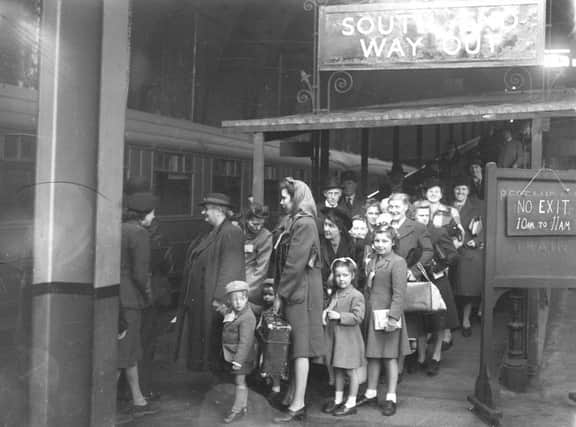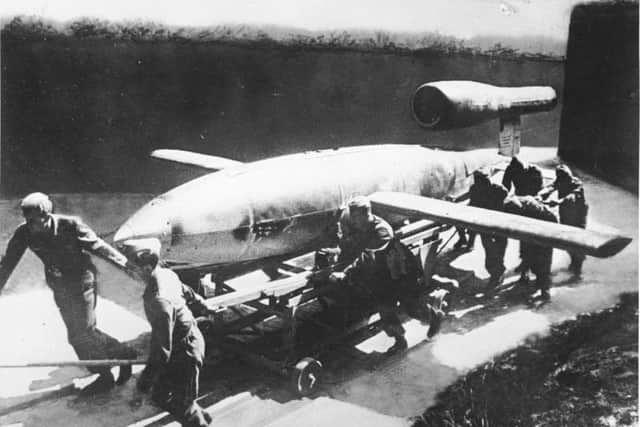From South Shields to rocket-stricken London


The 79-year-old told how he and his brother, along with a train-load of other children, came here in 1943, where they were taken in by big-hearted families, keen to help keep them safe from the Luftwaffe.
For years, John has tried, without success, to learn more about that experience.


Advertisement
Hide AdAdvertisement
Hide AdAs a result, he got in touch with Time Of Our Lives whose readers pointed him towards museum archives in Newcastle.
Alas, museum chiefs there were unable to shed any light on the South Shields-homed evacuees.
However, help was at hand from a source closer to home.
For John managed to track down a former “neighbour”, Fred Purkess, who had also lived in the East End of London during the Second World War.
Not only was Fred also evacuated from the capital – it turns out he was on the same train north as John was all those years ago.
Advertisement
Hide AdAdvertisement
Hide Ad“I was 13 at the time,” explains 87-year-old Fred, who now lives in Romford.
“Together with my two brothers, who were eight and 12 at the time, and my six-year-old sister, we were taken from Dagenham, where we lived, to London and Kings Cross.
“From there, we went to South Shields, along with a whole train of other children.”
Once on South Tyneside, Fred and his sibling, along with the many other displaced children, were gathered together and local families selected those they could care for.
Advertisement
Hide AdAdvertisement
Hide AdJohn recalls his mother telling him and his brothers and sister, that under no circumstances were they to be split up.
“Our mother said we could not be separated, and so nobody wanted to take responsibility for four young children,” says Fred.
“Eventually though, a Mrs Armitage volunteered to take us in.”
Fred says Mrs Armitage was a member of the Women’s Royal Voluntary Service, and had been working at the local rest centre when the selection process was taking place.
Advertisement
Hide AdAdvertisement
Hide AdHe said they were taken to her home in Lilac Avenue, Cleadon Village, where they stayed for about nine months.
Whilst there, Fred and the elder of his other brothers went to Cleadon Park Secondary School. His younger brother and his sister went to the junior school.
“Mrs Armitage was great with us. Every day she did dinners for us at dinner time, not in the evening; she must have worked very hard.”
After a while though she developed arthritis in her hands and could no longer cope with looking after four children, and contacted the youngsters’ mother, asking if they could be spilt up.
Advertisement
Hide AdAdvertisement
Hide AdAs this was out of the question, the children’s mother travelled north and took them back to London – just as the Germans began launching V1 rockets at the capital.
“We didn’t know, when we were there, that South Shields had been bombed,” added Fred.
“But the V1 attacks started just as we got back to the East End.”
After the war, Fred twice travelled to South Shields to visit Mrs Armitage, the last time being about 20 years ago.
Advertisement
Hide AdAdvertisement
Hide AdAlthough he and John no longer live nearby one another, Fred was happy to confirm his fellow evacuee’s recollections of their time on South Tyneside.
In particular, he recalls spending time at the seaside.
“We used to go to Marsden Beach,” adds Fred, “but, of course, it was covered in barbed wire.”
John, meanwhile, is delighted to have shared Fred’s memories, particularly in the light that he has spent so many years trying to find out why he and the other children were evacuated to South Shields.
“Surely someone somewhere must know why we were sent to South Shields?” he still wonders.
Advertisement
Hide AdAdvertisement
Hide AdJohn’s daughter, Rebecca Strange, said, in the original article, “This has played on my father’s mind for many years.”
If anyone can shed any further light on the East End evacuees’ time on South Tyneside, please get in touch.